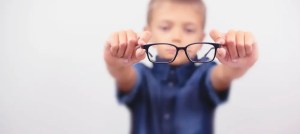Myopia, or nearsightedness, is a refractive error in which children and adults are easily able to see things in their near vision, however, it is more difficult to clearly see things in the distance.
Several recent studies both in the US and other countries show that the prevalence of myopia in children is growing at an alarming rate. This is important because high myopia can lead to glaucoma, retinal damage, cataracts, and macular degeneration later in life. If your child has myopia, what follows are some ideas about how to prevent myopia from getting worse.
Causes For Rise In Progressive Myopic Incidence
Many studies are taking place to understand the causes for this rise in progressive myopia. While eyeglasses, contact lenses, and refractive surgery are traditional treatments for myopia, the increasing degrees of nearsightedness remains an ongoing issue for scientists and eye professionals.
The main cause for myopia seems to be genetics. If both parents wear glasses for nearsightedness, it is likely their children will have the same issue, whereas if only one parent has myopia, the likelihood decreases.
The last several decades have made digital devices more prevalent, and their utilization by children has increased. With younger and younger children looking at a small screen, it appears to reinforce their nearsightedness.
What Can Parents Do?

Besides taking your children to an ophthalmologist like Pediatric Ophthalmology & Strabismus Associates for evaluations and maintaining their eyewear, there are other remedies a parent can do to prevent myopia from getting worse.
Some of these suggestions include the following:
- The World Health Organization recommends that children under the age of 5 spend 1 hour or less in front of a screen, and children under 1 year old should have no screen time.
- The Children’s Eye Foundation recommends no screen time for children under age 2. They also recommend no more than 1-2 hours per day for children 2-5 years old with frequent breaks.
- Encourage your children to spend more playtime outdoors every day. This helps them focus on distance vision. Research shows that spending more time outdoors in the sun slows the progress of nearsightedness.
Studies indicate that children who spend more time outdoors have a lower chance of becoming nearsighted. Using devices to keep children busy and occupied hour upon hour is a non-negotiable for parents. It may be a convenience, but you are damaging your child’s vision health.
What Pediatric Ophthalmology & Strabismus Associates Can Do
Certain methods of care can slow down the progression of myopia.
Current treatments include atropine eye drops, gas permeable contacts known as hard contact lenses, and multifocal eyeglasses or contacts.
Make an appointment with Pediatric Ophthalmology & Strabismus Associates to discover what treatment is right for your child with myopia, and other ways to prevent myopia from getting worse. Call (610) 347-7672 to schedule a visit at our office in Newtown Square, PA.
Sources:
Nearsightedness – Diagnosis and treatment – Mayo Clinic
Preventing the Progression of Myopia in Children – Consult QD (clevelandclinic.org)
